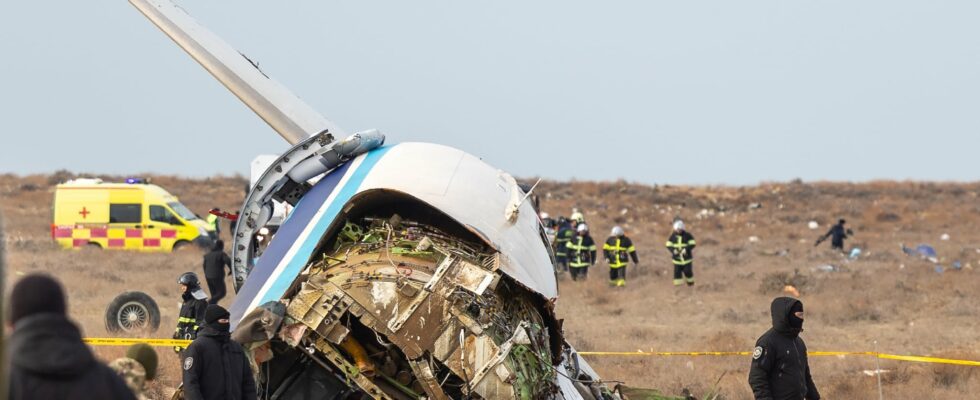Russia has promised: it will identify and punish those involved in the accident on Wednesday December 25 of an Azerbaijani airliner, which according to Baku was hit by Russian fire. The news was announced by the Azerbaijani prosecutor’s office on Monday December 30. The day before, President Ilham Aliyev accused Moscow of wanting to hide its responsibility in the crash of the plane flying from Baku to Grozny, and demanded a public apology and compensation. Vladimir Putin has since apologized and admitted that air defense fire took place on the day of the crash due to a Ukrainian drone attack, but without acknowledging that the plane was hit. This affair has once again darkened relations between the two nations, as dependent on each other as they have been shaken since the beginning of the decade by strong tensions concerning several issues, between Nagorno-Karabakh, natural gas and war in Ukraine.
According to Azerbaijani Prosecutor General Kamran Aliev, the head of the Russian Investigative Committee told him that “intensive measures are being taken to identify the culprits and bring them to criminal responsibility for their actions.” Moscow also promised to “conduct a complete, exhaustive and objective investigation” into this accident, in addition to the investigations carried out in Kazakhstan, where the aircraft crashed, the Azerbaijani prosecutor’s office said in a press release. Investigations are also being carried out at the accident site “with the participation of professional investigators and experts from Azerbaijan, Kazakhstan, Russia and Brazil”, the latter country being the manufacturer of the Embraer aircraft.
A relationship undermined by numerous tensions…
A sign of goodwill in the midst of the disaster, while the recently warmed relations between the two countries remain fragile and punctuated by numerous points of tension. Because Azerbaijan had been one of the countries of the former Soviet sphere which had given their support to the attacked Ukraine, in February 2022. While signing, by the hand of its president, an enhanced cooperation agreement with Russia little after Moscow’s recognition in February of the separatist republics of Donetsk and Lugansk. And it is also towards this Caucasian country that the European Union turned in 2022 to supply itself with natural gas, when it closed the taps on the pipelines coming from Russia after the invasion of Ukraine, notably thanks to the South Asian Corridor, a network of pipelines linking its gas reserves to Europe.
Another tense issue between the two countries, Nagorno-Karabakh, which although internationally recognized as part of Azerbaijani territory, has been disputed by Armenia since the late 1980s. In 2020, a war broke out, ending in a Azerbaijan’s victory and a ceasefire brokered by Russia, which also deployed peacekeeping forces to the territory. Before reconquering the area by force in September 2023, Baku accused Moscow of not enforcing the terms of the agreement, particularly regarding the disarmament of remaining Armenian groups in the region, exacerbating diplomatic tensions between the two nations.
…but interdependent
A cold that is part of a broader geopolitical context, where Azerbaijan is strengthening its alliances with powers like Turkey and the EU, while Russia struggles to maintain its influence in the Caucasus, a key space for its interests commercial and energy. A partnership concluded in 2010 with Ankara, which includes a mutual defense clause, also gives Azerbaijan additional security against a possible Russian threat. After this major disagreement in 2023, relations between Baku and Moscow warmed up last August. Vladimir Putin then made a state visit to the Caucasus country for the first time since 2018, to discuss regional and international problems.
Despite this new major incident, commercial and strategic relations between Baku and Moscow remain essential to both parties. Azerbaijan, 19% of whose imports come from Russia, has for several years occupied an essential strategic and geographical place in the North South International Transport Corridor (INSTC) project, which aims to connect India, the Iran, Russia, and other countries in the region through a route combining railways, roads and sea routes. This corridor would not only shorten freight transport times between Russia and India to around 25-30 days, compared to 40-45 days via traditional maritime routes, but also provide a strategic route to circumvent sanctions. Western countries using alternative land and sea routes.
